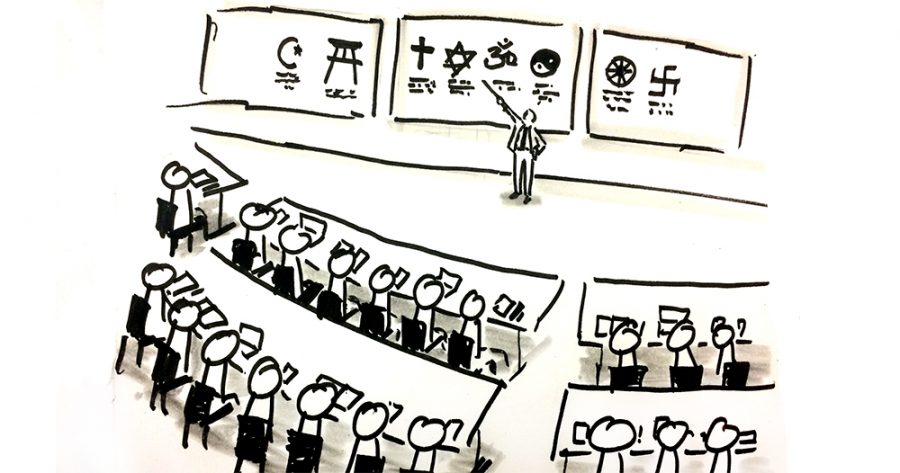We need a religion 101
Biola needs an undergraduate gen-ed religions class to help prepare students for interaction with other religions.
February 17, 2015
I grew up in a Christian home, always believing in the gospel. I felt no need to educate myself in other religions. Why should I when mine stands true? When I started to become friends with people of various beliefs from atheists, agnostics, Jews, and Buddhists, I realized the importance of learning about other religions.
Once I devoted myself to understanding what they believed and how they lived, they became more willing to have deep discussions about worldviews and religions. They came to me with questions about Christianity, knowing full well I would answer and respond with questions of my own about their views.
OFFERING A WORLD RELIGION CLASS
Although one could research religions on their own, nothing quite matches the experience of learning through a person practicing that specific religion. Unfortunately, we do not all have access to followers of other religions, especially here on campus. To help prepare students for their entrance into a world filled with thousands of religions and worldviews, Biola should offer the next best thing, an undergraduate course that could fulfill certain general education requirements, such as philosophy.
All undergraduate students at Biola must take the Foundations of Christian Thought course. We have heard the terms polytheism, monotheism, nihilism and many others because of this class. I believe this course provides a superb foundation for understanding other worldviews, but the class does not go in-depth about other religious practices. Why do the Jews refuse to believe Jesus is the Messiah? How do the Hindus differentiate between the different gods they wish to pray to? Why do the Muslims have Ramadan?
VISTING MOROCCO
This past year I visited Morocco right in the middle of Ramadan. I knew nothing about the practice or religion at the time. Imagine my confusion when I woke up to Muslims chanting on my first morning. Upon arriving in the country I spent most days fasting because they did too, although I am obviously not Muslim. Would they find it rude if I ate in front of them? In reality they probably did not, just like how we do not find it rude when someone does not practice lent. Despite this, I still refused meals throughout the day, simply out of politeness. I sat outside a restaurant and waited until sun down when the horn suddenly sounded signaling the beginning of the meal Iftar, right before I ordered. Doing this allowed me to connect with the Muslims I spoke with on a respectful level. One man, the restaurant owner, told me he appreciated me waiting to order until everyone else could too.
I could not have received that gratitude without knowing what they practice and believe. The family I stayed with helped me by informing me of this custom.
Biola encourages us to become missionaries, which is a good thing. But I also believe Biola should give us an opportunity for us to learn about the religions we will inevitably run into, especially abroad. By providing us with a class covering basic practices and beliefs, we can help diminish the ignorance many of us have towards other beliefs. This way we can eventually feel more comfortable interacting with people from different backgrounds.







